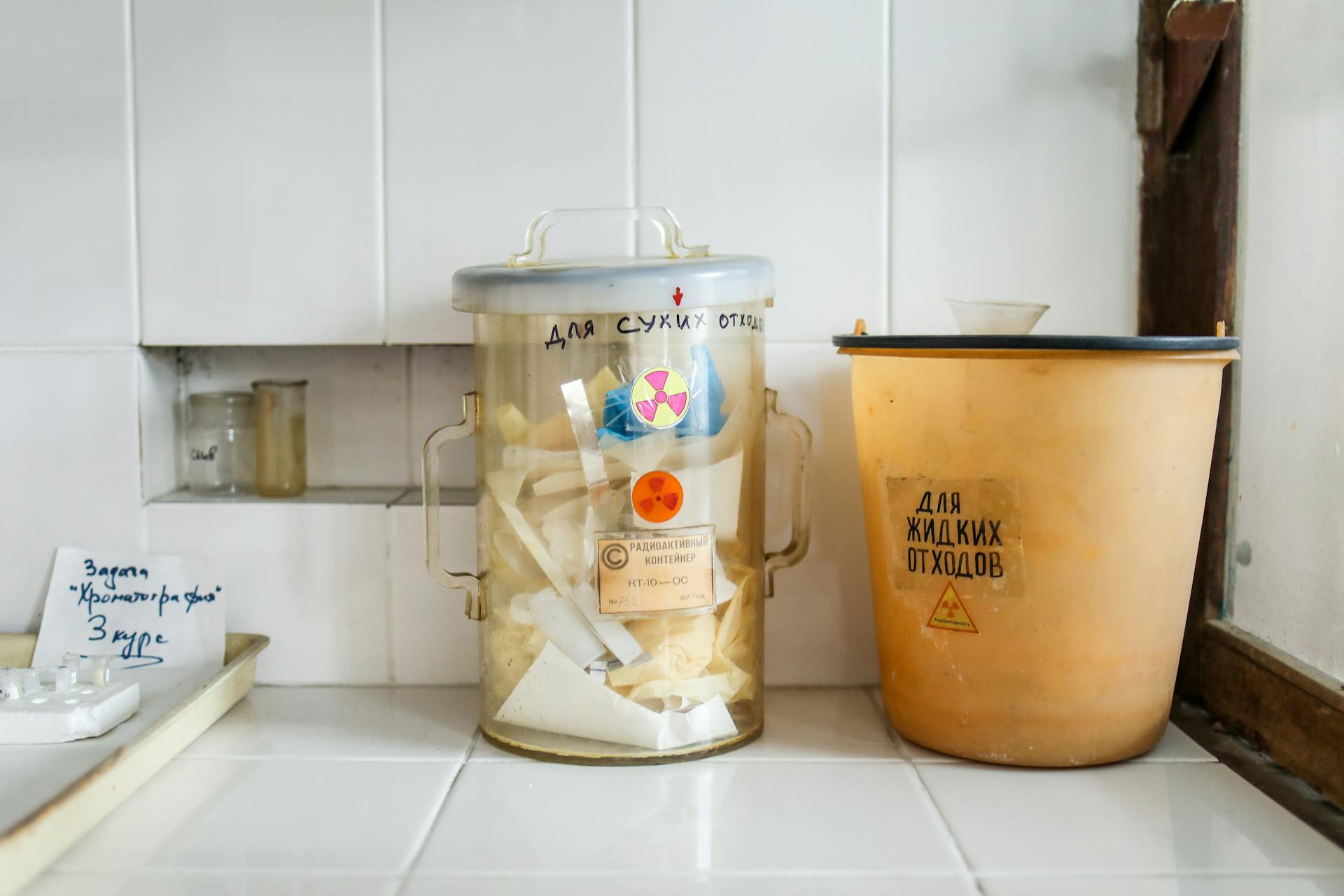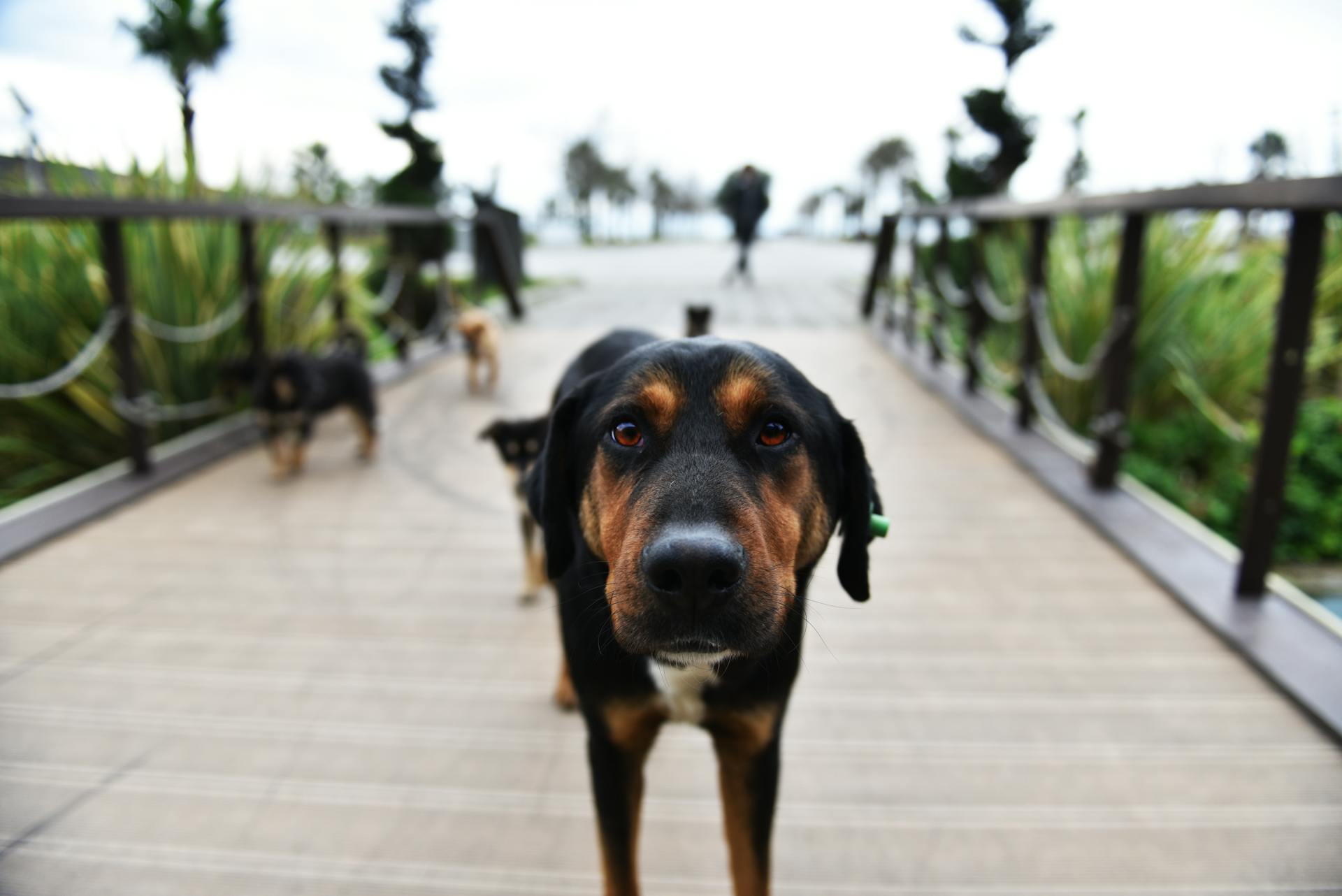
Dog poison control is a serious issue that can happen to any dog, regardless of age or breed. According to the ASPCA, over 100,000 cases of pet poisoning are reported every year.
To prevent poisoning, it's essential to keep toxic substances out of reach. Common sources of poisoning include household cleaners, medications, and plants like lilies and sago palms.
Be Prepared
Having a plan in place can make all the difference in case of an emergency. Keep your veterinarian's phone number handy and post it in a convenient location, such as on your fridge or near the phone.
You should also post the address and number of a nearby emergency clinic, along with the number of the ASPCA Animal Poison Control Center: (888) 426-4435. This is a unique resource for both pet owners and veterinarians, available 24 hours a day.
Having this information readily available can save precious time in case of an emergency. The ASPCA Animal Poison Control Center employs a staff of veterinarians and licensed technicians who are skilled in veterinary toxicology.
Here are some key phone numbers to have on hand: your veterinarian, a nearby emergency clinic, and the ASPCA Animal Poison Control Center.
For more insights, see: Health Benefits of Having a Dog
Identifying and Responding to Poisoning
If you think your dog has been poisoned, try to stay calm and act quickly, but rationally.
Gather up any potential poison that remains, as this may be helpful to your veterinarian and any outside experts who assist with the case.
Collecting vomit samples can also be crucial, as your veterinarian may need to see it.
Keep your pet calm and call your veterinarian or the ASPCA Animal Poison Control Center (APCC) at (888) 426-4435 for guidance.
Experts at the APCC are available to answer questions 24 hours a day, but be aware that there's a consultation fee.
Alternatively, you can call the Pet Poison Hotline at (855) 764-7661.
Pet Safety and Awareness
It's essential to be aware of the common household items that can be toxic to dogs. Avocado skin, pits, and leaves, as well as grapes and raisins, are just a few examples of substances that can cause harm.
Keep all medications, including those in child-proof bottles, in cabinets that are inaccessible to your dog. If you inadvertently drop a pill on the floor, be sure to look for it immediately. Supervise anyone who may need help taking medications.
Here's a list of some common household items that can be toxic to dogs:
- Avocado skin, pits, and leaves
- Grapes and raisins
- Hops from home brewing
- Select kitchen spices, herbs, and baking soda
- Macadamia nuts, even in small amounts
- Moldy or spoiled food
- Alcohol
- Caffeine
- Chocolate
- Raw, cooked, or powdered garlic, onions, leeks, or chives
- Grapes and raisins
- Sugarless candy, gum, or toothpaste with Xylitol
- Yeasted dough (raw bread, pastry dough, etc.)
Pet-Proofing Your House
Keep all medications, even those in child-proof bottles, in cabinets that are inaccessible to your dog. If you inadvertently drop a pill on the floor, be sure to look for it immediately. Supervise anyone, such as the elderly, who may need help taking medications.
Always follow guidelines on flea or tick products. Some products can be deadly to your pets if not used correctly.
Although you can safely give some 'people foods' to your pet as a treat, others are toxic. If you have any questions about what is safe, ask your veterinarian. Or, err on the safe side and give treats made specifically for animals.
Rodenticides should be kept in metal cabinets or high on shelves where your pets can't find them. Remember that dogs can be fatally poisoned by eating an exposed rodent, so always be very cautious about using these products.
If this caught your attention, see: Ant Poison Dog Safe
When buying plants for your home, opt for those that won't cause problems if your dog happens to nibble on them. The ASPCA has an online list of toxic and nontoxic plants by species.
Store all chemicals and cleaners in pet-inaccessible areas of your home. This includes automotive products, fertilizers, and household cleaners.
Here are some specific household items to keep out of reach of your pets:
- Medications for people or pets
- Many house plants and flowers
- Common household chemicals, such as antifreeze
- Several detergents and soaps
- Rodent poisons
- Fertilizers and herbicides
By following these simple steps, you can significantly reduce the risk of pet poisoning in your home.
What to Do If Your Pet Is
If you suspect your pet has been poisoned, act fast and call your vet or a pet poison hotline immediately.
Your pet's survival depends on how quickly it receives treatment.
If you can't get to the vet right away, try to keep your pet calm and quiet to prevent further harm.
Keep an eye on your pet's symptoms, which can include vomiting, diarrhea, and lethargy.
If your pet has ingested something toxic, don't try to make it vomit or give it water, as this can make things worse.
Get your pet to the vet as soon as possible, even if you're not sure what it's been poisoned by.
If this caught your attention, see: Vets Dog Treats
Medications and Substances
Never give your dog human medication, as it can be lethal. Even simple medications like aspirin can be toxic to your pet.
Some human medications, like acetaminophen, are toxic to cats and should never be used. Always follow the label directions and amounts correctly when giving your pet medications.
Here are some common household chemicals that can be lethal for pets:
- Antifreeze and other car chemicals
- Bleach and detergents
- De-icing chemicals and salts
- Expandable foam insulation
- Expandable glue (e.g., Gorilla glue)
- Fertilizers and herbicides
- Household cleaners, including drain and shower cleaners
- Insecticides
- Lead and heavy metals from batteries, paint, or linoleum
- Paint and paint thinner
- Pool chemicals
- Rodent poisons and baits (as well as poisoned vermin)
- Tar
It's also essential to keep rodenticides far away from your pet, as they can cause kidney failure, internal bleeding, and even death.
Provide a History
Providing a detailed history of symptoms to your veterinarian is critical. Immediately collect and preserve any vomit, food products, medication bottles, and stool samples to help your vet rule out or determine intentional poisoning.
Freezing vomit and stool samples is the best method to preserve them as evidence. You can do this yourself or take it to your vet to freeze and later send to a laboratory for testing.
As a concerned pet owner, it's up to you to provide your vet with information that could potentially save your pet's life. Symptoms are important as they allow vets to work backward and figure out the cause.
Substance First Aid
If you suspect your dog has ingested something poisonous, call your veterinarian or local emergency veterinary clinic right away. They'll need to know the brand name, ingredient list, how much your dog ate, when they ate it, and approximately how much they weigh.
Some poisons are more dangerous than others, and the ASPCA 24/7 Poison Control Hotline (888-426-4435) or the Pet Poison Helpline (855-764-7661) can offer guidance on the best course of action.
If you can't reach a veterinary professional, Poison Control can provide first-aid tips, including whether it's safe to induce vomiting at home.
Inducing vomiting may not always be the right thing to do, especially with certain toxins, so it's crucial to consult with a veterinarian or veterinary poison control center before taking any action.
Activated charcoal with or without an added cathartic like sorbitol may be administered to minimize absorption of the toxin, and intravenous lipid emulsion therapy may be given for severe cases of lipid-soluble toxins.
Discover more: Dog Reverse Sneezing and Vomiting White Foam
Pet Medications
Pet medications can be a source of danger for your furry friends if not used properly. Always use pet medications as directed, and be aware of the potential risks involved.
If your pet gets into their own meds and eats more than prescribed, call your veterinary team immediately. This can be a serious situation, and prompt action is necessary to prevent harm.
If your pet eats another pet's medication, or if a dog eats cat medication, or vice versa, seek veterinary attention right away. These situations can lead to adverse reactions and even poisoning.
A topical dog medication applied to a cat can also cause harm, so be cautious when using these products.
Here are some key things to remember:
- A pet getting into their own meds and eating more than prescribed
- A pet eating another pet's meds
- A dog eating cat medication, or vice versa
- A topical dog medication applied to a cat
People and Substances
As you're probably aware, people foods and substances can be just as hazardous to your pets as medications. Milk is not easily digested by most adult animals and can cause diarrhea.

Chocolate, especially baking chocolate, can be lethal to your pets, so it's best to keep it out of reach at all times. Rich, fatty foods like turkey skins or gravy can cause pancreatitis, a painful and serious condition.
Grapes and raisins can lead to loss of appetite, vomiting, diarrhea, abdominal pain, and acute renal failure in dogs, resulting in death. Coffee, including grounds and whole beans, is also a danger to animals.
Here are some common household substances to keep away from your pets:
- Cleaning products, such as liquid drain cleaners and tub and tile cleaners, can be lethal if ingested.
- Alcoholic beverages should be kept away from animals at all times.
- Nicotine is a stimulant that can increase the heart rate, leading to collapse and, in the worst case, death.
- Calamine lotion, diaper rash ointments, sunblock, and analgesic ointments contain an acid related to those in aspirin and can be toxic if ingested.
Always read labels carefully, especially when it comes to flea control products, which are often specifically labeled for dogs or cats. Never give your animal a human medication, as even something as simple as aspirin can be lethal.
Frequently Asked Questions
What is a quick remedy for a poisoned dog?
For a poisoned dog, a quick remedy is to induce vomiting with 1 tablespoon of 3% Hydrogen Peroxide, which can be repeated after 5 minutes if necessary. However, it's essential to seek veterinary guidance as soon as possible for proper treatment.
How do you flush poison out of a dog's system?
To flush poison out of a dog's system, a vet may perform gastric lavage, administer charcoal, and use colonic enemas as needed. IV fluids and pain medications may also be provided to support the dog's recovery.
Can a dog recover from poisoning on its own?
No, a dog cannot recover from poisoning on its own, as prompt medical attention is crucial to prevent serious harm or death. Contact your veterinarian immediately if you suspect your dog has ingested something poisonous.
Is there a free Pet Poison Helpline?
No, there isn't a free Pet Poison Helpline, but you can reach the ASPCA's 24/7 Animal Poison Control Center at (888) 426-4435 for emergency assistance.
What is the app for Aspca poison?
The APCC mobile app helps identify over 300 potentially hazardous substances, including household toxins, medications, and plants, with detailed information on each. Download the app to learn more about potential dangers in your home and community.
Sources
- https://www.webmd.com/pets/dogs/top-10-dog-poisons
- https://www.vet.cornell.edu/departments-centers-and-institutes/riney-canine-health-center/canine-health-information/first-aid-poisonous-substances
- https://www.americanhumane.org/fact-sheet/pets-poisons/
- https://www.banfield.com/en/Wellness-at-banfield/First-aid/List-of-common-pet-poisons
- https://www.georgiapoisoncenter.org/poisons/poison-hazards/pets-poisons/
Featured Images: pexels.com


